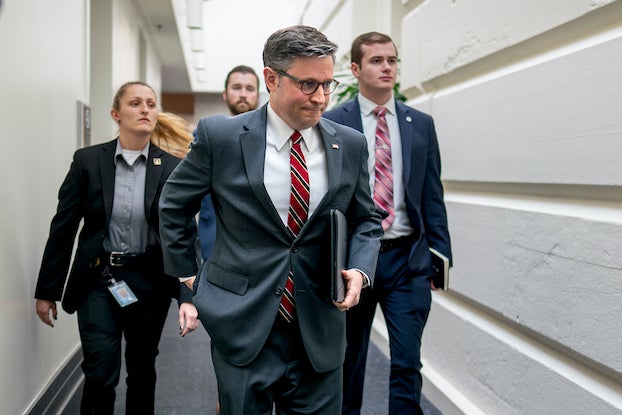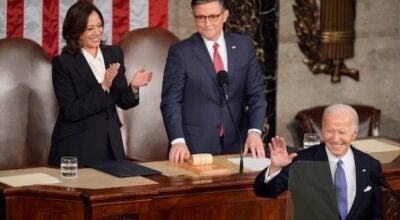Deal reached to avoid partial government shutdown
Published 8:12 pm Thursday, February 29, 2024

- Speaker of the House Mike Johnson, R-La., arrives for a closed-door GOP caucus meeting, at the Capitol in Washington on Wednesday, Feb. 14. (Associated Press)
Congress passed another short–term spending measure Thursday that would keep one set of federal agencies operating through March 8 and another set through March 22, avoiding a shutdown for parts of the federal government that would otherwise kick in Saturday. The bill now goes to President Joe Biden to be signed into law.
The short–term extension is the fourth in recent months, and many lawmakers expect it to be the last for the current fiscal year. House Speaker Mike Johnson said negotiators had completed six of the annual spending bills that fund federal agencies and had “almost final agreement on the others.”
“We’ll get the job done,” Johnson said as he exited a closed–door meeting with Republican colleagues.
The House acted first Thursday. The vote to approve the extension was 320–99. It easily cleared the two–thirds majority needed for passage. Democrats overwhelmingly voted to avert a partial shutdown. But the vote was much more divided with Republicans, 113 in support and 97 against.
The Senate then took up the bill and approved it during an evening vote of 77–13.
“When we pass this bill, we will have, thank God, avoided a shutdown with all its harmful effects on the American people,” Senate Majority Leader Chuck Schumer said moments before the vote.
Biden called Thursday night’s vote “good news for the American people” but added, “I want to be clear: this is a short–term fix — not a long–term solution.”
Next week, the House and Senate are expected to take up a package of six spending bills and get them to the president before March 8. Then, lawmakers would work to fund the rest of the government by the new March 22 deadline.
At the end of the process, Congress is expected to have approved more than $1.6 trillion in spending for the fiscal year that began Oct. 1. That amount is roughly in line with the previous fiscal year and is what former Speaker Kevin McCarthy negotiated with the White House last year before eight disgruntled Republican lawmakers joined with Democrats a few months later and voted to oust him from the position.
Some of the House’s most conservative members wanted deeper cuts for non–defense programs than that agreement allowed through its spending caps. They also sought an array of policy changes that Democrats opposed. They were hoping the prospect of a shutdown could leverage more concessions.
“Last I checked, the Republicans actually have a majority in the House of Representatives, but you wouldn’t know it if you looked at our checkbook because we are all too willing to continue the policy choices of Joe Biden and the spending levels of Nancy Pelosi,” said Rep. Matt Gaetz, R–Fla.
But Rep. Chuck Fleischmann, R–Tenn., countered before the vote that shutdowns are damaging and encouraged lawmakers to vote for the short–term extension.
“I want the American people to know, Mr. Speaker, that this negotiation has been difficult, but to close the government down at a time like this would hurt people who should not be hurt,” Fleischmann said.





